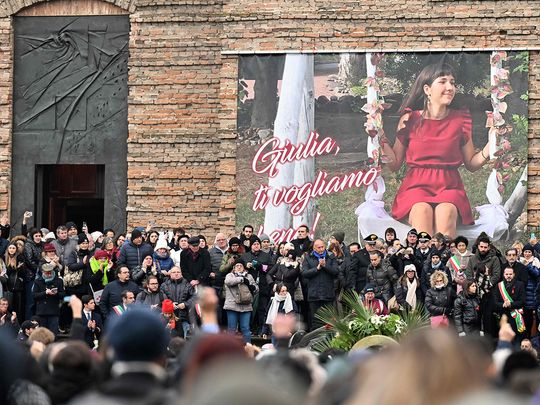
VENICE: A student who admitted murdering his ex-girlfriend in a brutal case that sparked outrage and soul searching in Italy was sentenced to life in prison Tuesday.
Prosecutors had requested Italy's harshest penalty for Filippo Turetta, 22, over the killing of Giulia Cecchettin in November last year, just days before she was due to graduate from the University of Padua.
Cecchettin, also 22, was stabbed at least 75 times in a shocking murder that prompted protests over violence against women across Italy.
Outside court, Cecchettin's father, Gino, said the sentence had not advanced the cause.
"I think gender violence shouldn't be fought with sentences but with prevention, teaching concepts that maybe are still a bit far off," Cecchettin told reporters.
"As a father, nothing has changed versus yesterday or a year ago."
The reading of the sentence, which was broadcast live on Italian television, elicited no visible reaction from Turetta.
His lawyer Giovanni Caruso had called the request for life imprisonment excessive, saying his client was "not Pablo Escobar", the notorious Colombian drug baron.
When the trial opened in September, Caruso warned against a "media trial" and last week insisted there were no "aggravating circumstances" such as cruelty or premeditation.
But prosecutor Andrea Petroni said Turetta acted with "particular brutality", attacking Cecchettin before fleeing with her in his car.
Her body was found a week after she went missing in a gully near Lake Barcis, north of Venice.
Turetta was arrested a day later near Leipzig in Germany after his car ran out of petrol.
Gino Cecchettin said last week that nothing would bring his daughter back, but his goal was "to ensure there are as few possible cases like Giulia's, that there are fewer parents who have to mourn a dead daughter."
'Patriarchy kills'
Cecchettin's murder is one of a string of femicides that have made headlines in Italy in recent years, but it struck a nerve, pushing the issue to the forefront of public discourse.
Thousands of people turned out to pay their respects at her funeral and her father implored men to "challenge the culture that tends to minimise violence by men who appear normal".
Giulia's sister, Elena, called for a cultural revolution, urging sympathisers to "burn everything" - a message since scrawled on walls and protest banners, often alongside the phrase "Patriarchy kills."
Out of 276 murders recorded by Italy's interior ministry so far this year, 100 of the victims were women - 88 killed by someone close to them, the vast majority by a partner or ex.
This compares to 110 out of 310 murders in the same period last year, with 90 killed by someone close to them. In 2022, 106 women were killed by someone close to them, and 107 in 2021.
Cecchettin's family has set up a foundation in her name, pressing for better education, more support for women facing violence and greater efforts to encourage equality and respect.
Last month, thousands of people marched through Rome and the Sicilian capital Palermo to mark an international day against femicide, many of them walking in Cecchettin's name.
Blaming migrants
While denouncing historic discrimination against women and a lack of policies such as sex education in schools, some campaigners accused Prime Minister Giorgia Meloni's hard-right government in particular of failing women.
Education Minister Giuseppe Valditara sparked uproar last month by saying that "male domination no longer exists" in law in Italy, and linking violence against women to illegal immigration.
Elena Cecchettin hit back that her sister, a biomedical engineering student, was killed by a "young white Italian".
Meloni, Italy's first woman prime minister, said last week that legislation was not lacking in Italy, but that "the challenge remains above all cultural".
The leader of the far-right Brothers of Italy party also made a link with illegal immigration - even though official figures from 2022 show that 94 percent of Italian female murder victims were killed by Italians.












